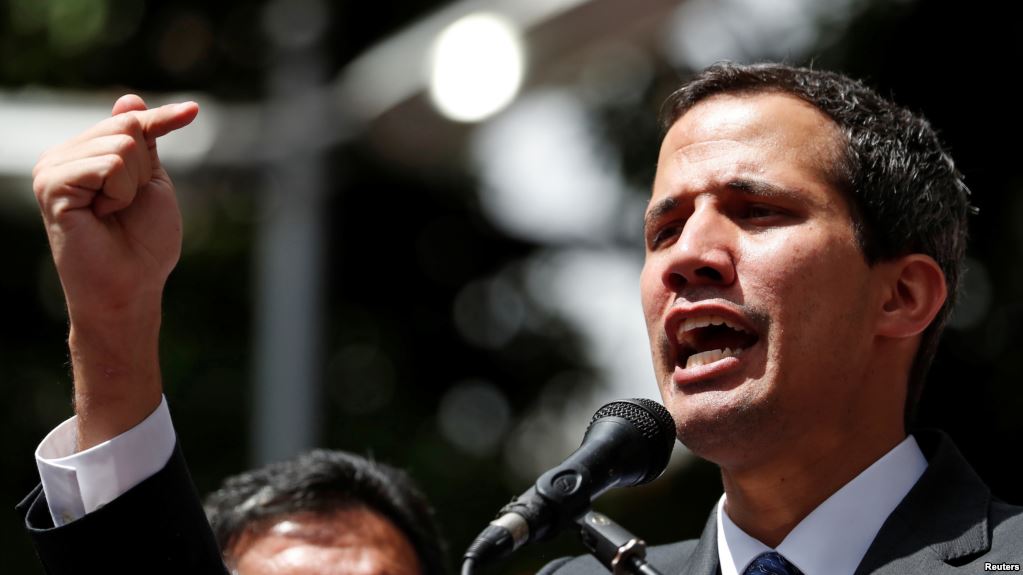Financing color revolutions at the expense of the recipient country
 Event: The United States transferred control of the accounts of the Venezuelan government to self-proclaimed President Juan Guaydo. The corresponding statement was made by the representative of the US State Department, Robert Palladino, who stressed that, according to Washington, this step “will help the country’s legitimate government to protect financial assets for the benefit of the people of Venezuela.”
Event: The United States transferred control of the accounts of the Venezuelan government to self-proclaimed President Juan Guaydo. The corresponding statement was made by the representative of the US State Department, Robert Palladino, who stressed that, according to Washington, this step “will help the country’s legitimate government to protect financial assets for the benefit of the people of Venezuela.”
The purpose of the action: to seize control over the finances of the Venezuelan government by transferring them to the use of the opposition. Try out the instrument of confiscation of the finances of the recipient country in favor of the pro-American opposition. Transfer the cost of financing the color revolution on the shoulders of the people of Venezuela. Financially secure a civil war in Venezuela.
Direction: public administration.
The powers of Guaydo in addition to the United States recognized Canada, Colombia, Peru, Chile, Costa Rica, Argentina, Ecuador, Paraguay, Dominican Republic, Panama, Honduras, Costa Rica, Haiti, Brazil, Israel. On the support of the opposition parliament led by “ i/c President “said most of the EU countries. On the side of Maduro were Bolivia, Uruguay, Mexico, Belarus, China, Cuba, Nicaragua, El Salvador, Russia and Turkey.
Instrument: international politicians, diplomatic departments, financial institutions
Method: parallel government, diplomatic sanctions, economic blockade.
Media coverage:
https://www.nytimes.com/2019/01/29/us/politics/venezuela-bank-accounts-guaido-pompeo.html
https://www.vesti.ru/doc.html?id=3110177
https://ria.ru/20190130/1550103333.html
The reaction of society: at the moment the society in Venezuela is experiencing a deep split. Against the background of the coup d’état provoked by the architects of the protracted economic and social crisis, some citizens are ready to accept the overthrow of President Maduro, including allowing for the possibility of foreign armed intervention.
The self-proclaimed “president” Guaydo said that he believed in the possibility of a peaceful transfer of power in the country, calling for further protests.
“We have to put a lot of pressure on the dictator so that he leaves and can form a provisional government and hold free elections,” he said in his last interview with CNN.
In turn, the position of Chavez’s successor is strong, thanks to the support of the army, the security apparatus, socialist-minded citizens and people from the poor who have access to quality education, medicine, and improved their living conditions through social programs practiced in the Bolivarian Republic. Maduro himself has enough political will to resist the interventionists to the end.
The Foreign Ministry of Venezuela condemned the US decision to transfer access to the accounts of the Venezuelan government in American banks to the head of the opposition parliament Juan Guaydo, promising a backlash. According to official diplomats, this is “a shameless theft from a sovereign state of resources destined for the welfare of its people.”
International reaction: The US continues to put pressure on the international community to achieve maximum delegitimization of Maduro. In addition, they expanded the range of economic sanctions: on January 28, they completely blocked the assets of the state oil company PDVSA in the amount of $ 7 billion, refusing to transfer the proceeds from the sale of oil to Caracas. This company is the main source of income for the country.
A part of the gold reserve of the Bolivarian Republic is located in Turkey, which they are persistently trying to convince to stop being a channel for its delivery.
Plans are also considered for direct intervention in the country. So, on Monday, January 28, Presidential Adviser on National Security John Bolton attended a briefing with a notebook in which the phrase “5,000 troops in Colombia” was written. Earlier, Bolton threatened the prosecutor general of Venezuela with “serious consequences” after he demanded that the Supreme Court of Venezuela dosen’t allow opposition leader Juan Guaydo to leave the country.
What they have achieved: The decisive phase of the coup d’état stumbled upon fierce resistance from the current government. There is a deepening split in society: the country is rapidly sliding into civil war, so it was crucially important to finance the opposition and provide it with resources to start a civil war. For this purpose, the assets of the state oil company PDVSA were transferred to it. This suggests that the interventionists will stop at nothing to achieve their goals, while other countries that seek to resist PaxAmericana serve as a warning in terms of the need to take care of their financial security.
